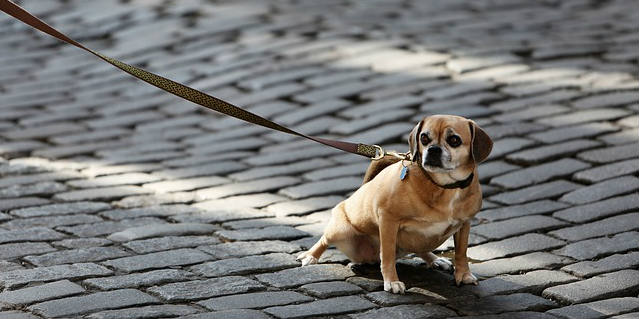My dog doesn’t want to walk. What is the cause and treatment?
Original Question: Dudley our dog has suddenly decided he does not want to walk. He has been thoroughly checked out by the vet. Blood work taken, anal glands expressed, each joint thoroughly checked and she found nothing wrong with him. I believe it is strictly behavioural or maybe even depression. I have changed his leash, tried louring him with treat, tried louring him with a squeaky toy, nothing works. I have been positive during this period, trying for him not to see my frustration but I am out of ideas. Anything you could suggest I would appreciate. - Debbie
 Jun 28, 2018
Jun 28, 2018
Hi Debbie,
Sorry to hear that you are going through this. I can’t diagnose the problem but I can give you some thoughts.
There are many reasons why dogs may develop this clinical symptom of not wanting to walk. I want to be clear about something…I have NEVER seen a dog experience these symptoms for a behavioral reason. Many pet owners are quick to blame a behavioral issue as the source of new symptoms, but depression from a purely mental standpoint in the absence of disease is so unlikely I want to state that it is near impossible. I think you need to perform more diagnostics and a more thorough examination.
If a dog refuses to walk they usually have either a source of pain, a musculoskeletal disease or a neurological disease. First I would recommend that you have your veterinarian examine your dog for any back pain, neck pain which is incredibly important to assess and dental pain. I’ve seen many dogs become depressed and lethargic from dental disease which can make them refuse to visit the park. Have your veterinarian investigate each tooth with a dental probe to determine if there is pain present. Neck pain is a significant source of discomfort and is sometimes not well examined in a routine visit. If you feel that the exam was not entirely thorough, I recommend you find a second opinion.
Assessing for arthritis means more than just feeling the joints. There could be damage to joints deep inside the body that are causing pain that can’t be palpated from the outside during a routine examination. I suggest you have X-rays performed of the joints, the spine, and the neck before you rule out this as a source of the problem.
There are neurological diseases that can cause extreme lethargy like this and some are quite uncommon. If your dog is having trouble advancing their limbs forward or placing their paws down in the wrong place, I would recommend that you visit with a neurologist to evaluate for any deficiencies here. There is also a specific disease called Myasthenia Gravis which you can look up. It occurs in people and dogs and you may find that some of the symptoms are similar to what your dog is experiencing. A neurologist would be best suited to assist in the diagnosis and treatment of this possible condition.
Lastly, keep in mind that other diseases could be festering under the surface causing pain, such as bladder infection, kidney infection, heart disease, etc. Be sure to perform more specific diagnostic testing and imaging to evaluate these other conditions.
I truly believe there is a medical cause for this and it’s just a matter of finding it.
I hope this helps.
Dr. Clayton Greenway


Disclaimer: healthcareforpets.com and its team of veterinarians and clinicians do not endorse any products, services, or recommended advice. All advice presented by our veterinarians, clinicians, tools, resources, etc is not meant to replace a regular physical exam and consultation with your primary veterinarian or other clinicians. We always encourage you to seek medical advice from your regular veterinarian.

